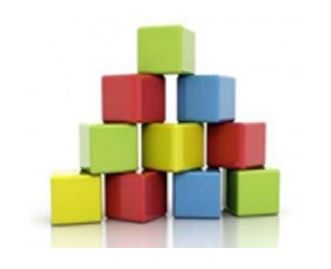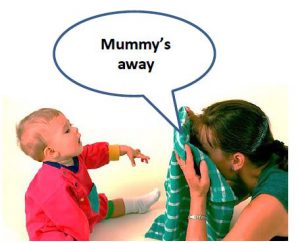

You can add words into your people game. Start with simple words and repeat them every time you play the game. Think about the words your child might say in the game if they could and you say them instead.
It is important to use the same words each time as this helps your child to understand the rhythm of the game and to predict what is coming next. Then don’t forget to wait after you say the words. This will let your child know you are waiting for them to take their turn and keeps the interaction going.
Watch Jacob and his mum again in the video and see how she adds words during their People Game.
Add more words into your People Game
- What do you think your child would say if she could?
- You say it instead.
- Use short simple sentences e.g. ‘mummy’s away’; ‘more tickles’; ‘splish splash’; ‘up, up, up’; ‘bouncey bounce’
- Make it fun!
- Repeat the same words each time
- Don’t forget to wait after you say the words – you are waiting for your child to take their next turn.
The rhythm of the game is VERY important
It is important that you say the same words each turn so your child gets to know the rhythm of the game and gets the chance to hear the words over and over.
The rhythm of the game is really important for children, especially those who are just beginning to stay connected with you.
You can use sounds and words to give the game a strong rhythm e.g. in a tickle game you could say ‘aahhhh’ as you build up to the tickle, and then ‘tickle tickle’ while you tickle the child. The ‘aaahhh’ really helps your child to focus and to know what is coming next.
Too many words can lose the rhythm of the game so it may take a few tries before you find the right balance.
For more People Games ideas see https://connectability.ca/2010/09/23/people-games/
Session F Video: https://view.pagetiger.com/sure-start-building-blocks-for-communication/1
Video Script
People Games are a perfect way for babies to practice turn taking conversations.
Jacob’s brain is making important connections every time he takes a turn with Mum.
These connections will help his brain learn about how language works, but also about his mum’s love for him, and that he can depend on her.
Jacob is having a joke with his mum. He understands that his turn is to kick his legs, and mum gives him time to do this before she repeats her part in the game (Mum says ‘don’t you kick mummy……. don’t you kick mummy………….who are you kicking?’).

